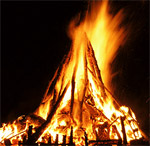Dulla Bhatti facts for kids
Quick facts for kids
Dulla Bhatti
|
|
|---|---|
| Born | 23 July 1547 |
| Died | 26 March 1599 (aged 51) |
| Other names | Abdullah Bhatti |
| Known for | Rebelling and fighting against the Mughal emperor Akbar's centralised land revenue scheme (lagaan) |
Dulla Bhatti (also known as Dullah Bhatti and Rai Abdullah Bhatti) is a famous Punjabi folk hero. He lived in the Punjab region a long time ago. Dulla Bhatti led the people of Punjab in a revolt against the Mughal rulers. This happened during the time of the Mughal emperor Akbar.
Interestingly, Dulla Bhatti is not mentioned in official historical records from that time. We only know about him from old Punjabi folk songs. These songs tell stories of his brave deeds. He is remembered for helping poor people and fighting against unfair rules.
Contents
Who Was Dulla Bhatti?
Abdullah Bhatti was a Muslim Rajput from Punjab. He lived in a place called Pindi Bhattian. His family were local leaders who owned land, known as zamindars.
Both his father, Farid, and his grandfather, Bijli (or Sandal), were executed. They were killed for standing up against the new land tax system. This system was put in place by Emperor Akbar. Dulla was born to his mother, Ladhi, four months after his father died.
A Royal Coincidence
Emperor Akbar's son, Shaikhu (who later became Jahangir), was born on the very same day as Dulla. Akbar's advisors told him something interesting. They said that if Shaikhu was fed by a woman whose own son was born on the same day, he would grow up brave.
So, Akbar chose Ladhi, Dulla's mother, to feed his son. This was a surprising choice. Ladhi's husband had rebelled against Akbar. But Akbar hoped that being kind to Ladhi would stop Dulla from rebelling too.
Dulla's Early Life
As part of this royal kindness, Dulla Bhatti went to school. At first, he didn't know what had happened to his father and grandfather. But he didn't like the strict school rules. He felt they were designed for rich people.
Dulla left school and started getting into mischief. One day, his mother, Ladhi, told him the truth. She explained how Farid and Bijli had died. This made Dulla's rebellious spirit even stronger.
He didn't just want revenge for his family. He wanted to fight for all the poor people in the countryside. Dulla saw this as a fight for the common people against unfair rulers.
Dulla's Fight for Justice
Dulla Bhatti's fight for justice took a special form. He became a "social bandit." This means he would take things from the rich and give them to the poor. He was like a hero who helped those who couldn't help themselves.
Folklore tells many amazing stories about him. One famous story is how he saved girls from being kidnapped and sold as slaves. He would arrange marriages for them and even provide their dowries. A dowry is money or gifts given to the bride's family.
His actions might have even influenced Emperor Akbar. Akbar later decided to make things easier for people in the Bari Doab area. He removed the land tax requirement there. This was possibly influenced by Dulla's efforts and the advice of Guru Arjan Dev Ji.
Dulla's End and Legacy
Dulla Bhatti's story ended in 1599. He was executed in Lahore. Emperor Akbar wanted to make an example of him. He expected Dulla to be scared at the public execution. But Dulla remained brave and defiant until the very end.
A poet named Shah Hussain, who lived at the same time, wrote about Dulla. He recorded Dulla's last words: "No honourable son of Punjab will ever sell the soil of Punjab." These words show his strong love for his land and people.
How Dulla is Remembered
Today, only parts of the old vars (medieval poems sung to music) about Dulla Bhatti still exist. Performances by dhadis (storytellers who sing and play instruments) about his adventures are less common now.
But Dulla Bhatti is still remembered as a hero. He is especially remembered as a protector of Punjabi girls. This memory is celebrated every year during the Lohri festival. Lohri is a popular festival in the Punjab region.
During Lohri, people sing a special song called "Sundri-Mundri." This song is a tribute to Dulla Bhatti. His life has also inspired many modern works. These include a play called Takht-e-Lahore from 1973. A novel about him was also written by Baldev Singh Sadaknama.
Many films have been made about Dulla Bhatti's life. These include Punjabi films like Dulla Bhatti (1966), Dulla Bhatti (1998), and Dulla Bhatti (2016). A Pakistani film called Dulla Bhatti was also made in 1956.
Images for kids
See also
- Papadu
 | Madam C. J. Walker |
 | Janet Emerson Bashen |
 | Annie Turnbo Malone |
 | Maggie L. Walker |



